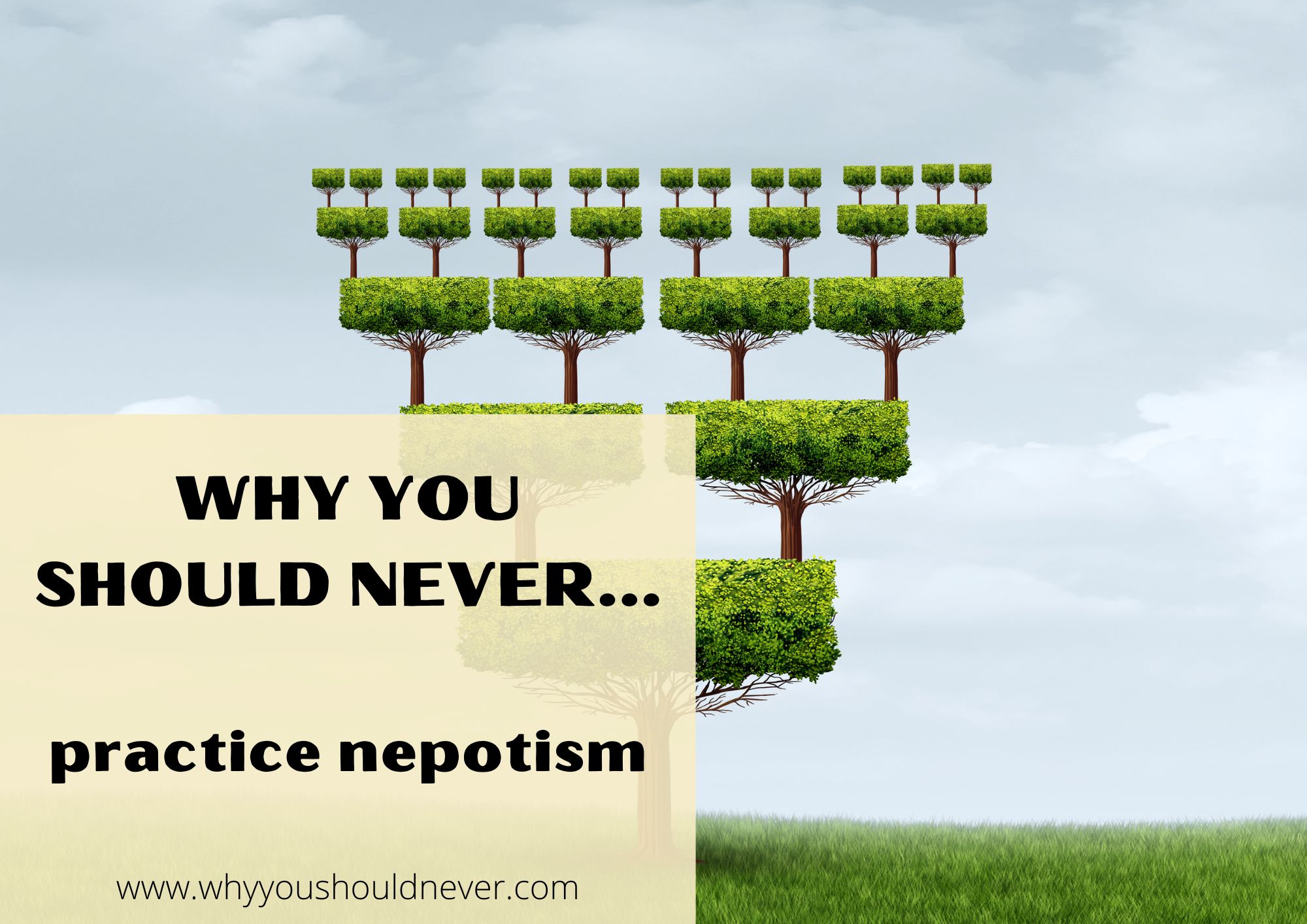![]()
Why You Should Never Practice Nepotism
Ah, nepotism. The age-old tradition of giving your cousin Joe the job instead of that Harvard grad with a perfect resume. It’s tempting, right? After all, it’s comforting to surround yourself with familiar faces in the workplac.
Plus, if you’re the boss, it gives you a warm, fuzzy feeling to hand out opportunities to people you already know and love. “It’s for family!” you say, justifying the decision.
There’s no denying that the benefits of nepotism can be gratifying, but the long-term drawbacks are sneaky and far-reaching. So, let’s take a deep dive into the muddy waters of nepotism, shall we?
10 disadvantages of practicing nepotism
1. It undermines meritocracy
So, imagine that you’re at a talent show and the judge give first place to their kid, even though another child belted out an amazing version of “Let It Go.” Unfair, right?
In a workplace that thrives on nepotism, skills and achievements are often overlooked. The main thing that counts is who you’re related to or who you’re pals with.
This can make truly talented employees feel overlooked and unappreciated, which in turn affects their performance and motivation.
2. Breeds a toxic culture
Imagine you find out the boss’s niece just got promoted, even though she’s been slacking off. How would you feel? Most likely, a bit bitter.
Nepotism creates an environment where favoritism flourishes like mushrooms in a damp forest. When some employees are given special treatment, it can make the workplace feel like a high school clique, rather than a professional setting.
This kind of culture can cause good employees to seek jobs elsewhere, leaving you with a team that’s not the best it could be.
3. Puts pressure on the “favored” individuals
Let’s flip the script for a moment. Suppose you’re the boss’s nephew who just got the big promotion. Yay for you, right? But hold your horses. This privilege comes with an invisible weight. Co-workers might expect you to fail and look for any sign to say, “I told you so.” The pressure to perform can become overwhelming, affecting both your work and mental health.
4. Stifles innovation and growth
When you keep things “in the family,” you’re essentially creating a bubble around your business. Fresh ideas? Out the window. Diverse perspectives? Say goodbye.
Nepotism tends to keep the status quo and restricts your company’s potential for innovation and growth. This lack of new blood can result in stale ideas, outdated methods, and a general sense of “meh” that can turn clients and customers away.
5. It’s legally risky
Alright, let’s get a little serious for a moment. If your hiring and promotion decisions are based on relationships rather than merit, you might be skirting dangerously close to discriminatory practices. Lawsuits claiming unfair treatment can be costly in terms of both money and reputation.
6. Sows seeds of resentment among staff
Imagine a workplace where everyone knows that the boss’s son doesn’t have to work as hard as they do. This kind of atmosphere is a breeding ground for resentment. Over time, this bad feeling can pile up like dirty laundry, making the office environment downright stinky.
Employees who feel resentful are less likely to be productive or engaged in their work, which is bad news for any business.
7. Weakens accountability
When family members or close friends are in the same workplace, there’s a natural tendency to let things slide. “Oh, it’s just Uncle Bob being Uncle Bob,” you might say as he misses another deadline.
This lack of accountability can weaken the overall performance of your team and create inconsistencies that customers and clients will notice. Without clear standards for everyone, the business becomes as wobbly as a three-legged table.
8. Limits professional development
Let’s say your sister is your supervisor. How honest will she be during your performance review? Chances are, personal feelings might muddle her professional judgment. This lack of honest feedback can stunt your career growth and keep you from reaching your full potential.
Meanwhile, employees who aren’t in the “inner circle” may miss out on growth opportunities because they’re not given a fair chance to prove themselves.
9. Causes conflicts of interest
Take this scenario, if you will: you’re in a meeting discussing budget cuts, and your cousin is in charge of a department that’s under-performing. Are you really going to be impartial?
Nepotism can cause serious conflicts of interest that make it hard to make unbiased business decisions. This can hurt the company in the long run and create tension between departments or teams.
10. Damages your reputation and brand
Whether you like it or not, word will eventually get out. Thanks to social media and company reviews on websites like Glassdoor, news of nepotism can spread like wildfire.
A reputation for favoritism can make it hard to attract top talent or keep existing high-performers. It can also affect customer perception, as people may question the integrity of a business that doesn’t appear to play fair.
Wrapping things up
The tangled webs we weave when we practice nepotism!
While it might give you the warm fuzzies to promote your brother-in-law, the real cost is more than just ruffled feathers around the water cooler. You’re missing out on a world of talent, innovation, and pizzazz that could push your business into the stratosphere. It’s like choosing a stale bag of chips when there’s a smorgasbord of gourmet snacks waiting to delight your taste buds.
Before you hand out that plum job to a family member or a BFF from college, I urge you to reconsider. Open the doors of opportunity wide and let the best person for the job strut right in. You’ll not only create a happier, more vibrant workplace, but you’ll also sleep better at night, knowing you made the right call.
